General
Frederick Kyazze: The Unwavering Custodian of Mak’s Transcripts Office
Published
9 years agoon
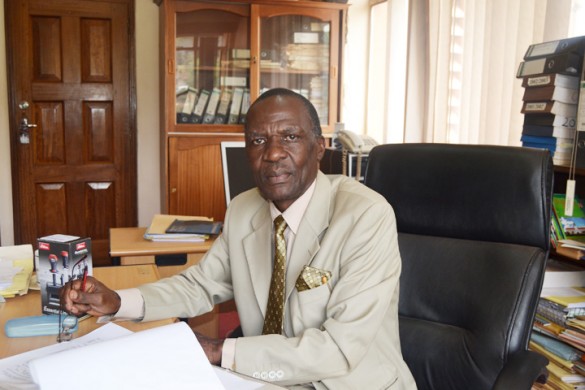
Frederick Mbabaali Kyazze speaks with firmness as he shares his life-changing experience at Makerere University. The 62 year old senior citizen of average height, dark complexion and a lean frame has recently retired from Makerere University after fourteen years of dedicated service as a Senior Assistant Registrar. Tiny wrinkles of untold wisdom are beginning to form on his face. His eyes are a deep haven of thoughts and exude intelligence. He turns up for this interview in a neatly pressed cream suit, which reminds me that neat suits have been his trademark over the years. He begins to speak, carefully choosing his words.
Joining the Transcripts Office
In the year 2000, Kyazze joined Makerere University as an Assistant Registrar, Senate Division. After only six months, the hardworking man was assigned a bigger responsibility to head the Transcripts Office. His immediate Supervisor at the time, who later became Academic Registrar of Makerere University Mr. Amos Olar Odur, referred to this move as a vote of confidence in Kyazze. He was subsequently duly appointed to the rank of Senior Assistant Registrar.
“At that time, there was a general public outcry about transcripts in Makerere University. I recall a famous joke on one of the local FM stations that ‘okufuna transcript e Makerere, bakutuma mu ggulu,’ loosely translated as ‘it is easier to go to heaven than to get a transcript from Makerere University.’ Now as Head of the Transcripts Office, I knew it was time to roll up my sleeves and get to serious work; and I resolved to endeavour to not only do good, but do it well too,” Kyazze reminisces.
“I received a letter transferring me to the Transcripts Office with immediate effect. At about 2:00pm, I entered my new office and started work, without induction. My predecessor, Rose Bwire, was also needed in another unit immediately. I take this opportunity to kindly request the concerned officials to pay attention to induction of new officers when transfers are made. I had some challenges in adjusting to my new role minus induction but with the guidance of a few colleagues, I later found my way around,” he says. This new development came with additional responsibilities for Kyazze.
It is then that Kyazze learnt of the various hindrances to fast acquisition of transcripts at Makerere University. Cases of missing/misplaced marks, late submission of marks and submission of incomplete marks were the most common reasons for delayed transcripts. Kyazze would have to face the students one after another and explain to them that everything possible was being done to process their transcripts. He and his team, would then work backwards to resolve the issue with the relevant department. But this did not always go well with the affected students, some of whom would throw insults at him. It is from such incidents that the then Acting Academic Registrar (AR), Sebastian Ngobi referred to him as the punching bag of Makerere University. “This nick-name was because whoever had issues with their transcript came to me. A student would not know which lecturer or department had not submitted results in time. I was the face of the University and I took the punches. I could not reveal to the students where the problem lay even when I knew it. I used to call myself the devil that the public loves to hate,” he recalls with nostalgia.
Transformation of the Transcripts Office
Kyazze shares that most of the Department’s operations were manual at the time. Ordinary typewriters were used to inscribe on the transcripts. Faculties submitted results manually on a results sheet. This contributed to further delays in processing transcripts. Nonetheless, Kyazze inspired his team to do their best in the circumstances. But in 2003, the Academic Registrar’s Department started automating its processes.
In 2009, Kyazze became the Acting Deputy Registrar in charge of the Examinations and Transcripts Division. This was an internal arrangement in the AR’s Department, pending confirmation from the Human Resource Directorate. This new role required Kyazze to timetable university wide examinations, draft budgets for these exams and writing to the various Faculties requesting them to nominate external examiners. Nonetheless, he continued to help out in the Transcripts office too.
Kyazze recalls that in 2009, the then Acting Vice Chancellor, Prof. Venansius Baryamureeba walked into his office and directed that transcripts be ready for issuing on graduation day. “This was the beginning of major change. We worked so hard even on 26th December to ensure that transcripts for the January 2010 graduation ceremony were ready. I am glad that by graduation, we had 80% of the transcripts ready. The remaining 20% were processed shortly afterwards. Commendably, the VC made sure that we were properly and promptly rewarded for these extra hours and we felt so motivated,” he narrates with a smile. Early processing of transcripts now became a culture and continues to date, save for few problem cases. Kyazze partly attributes this to the computerized management of data.
Another transformation has been in the date the Academic transcript bears. Initially since the 1980s, transcripts would carry the date of graduation, but this has since been revised to the date of completion since graduation comes much later in the following year and this led to delays in issuing definitive transcripts. Only the certificate bears the date of graduation.
During his tenure, Kyazze initiated improved furnishing and equipping of the transcripts office. “We produce transcripts massively. With time, I realized that storage of these transcripts was becoming a challenge. Since at that time the AR’s Department was managing its own budget, I proposed procurement of more filing cabinets across the department and this was done,” he explains in reference to the permanently fixed cabinets.
Paradoxically with the massive production of transcripts, thousands remain uncollected. The AR’s department continues to call out to graduates to pick their transcripts spurning as far back as the 1990s
Memorable moments
During his tenure at Makerere University, Kyazze has interacted with and served people from all walks of life. He vividly recalls a time when he attended to Cardinal Emmanuel Wamala. “A colleague, Simon Sagala who was the Manager of the University Printery at the time, came running and informed me that Cardinal Wamala was in the queue with students waiting to see me. I requested that the Cardinal be ushered in. He was here on behalf of a Priest from Kabale, whose transcript was urgently needed in Rome. I was able to help the Cardinal that very day,” says Kyazze. He also recalls having attended to the former Minister of Education, Hon. Geraldine Namirembe Bitamazire and former Deputy Chief Justice Leticia Kikonyogo, who were personally inquiring about their children’s transcripts. He is particularly happy that his signature is out there on thousands of transcripts. “This is a legacy that I am so proud of. I know my name will be remembered occasionally by these people and I am grateful to God for the opportunity to have served,” he says.
Lessons learnt
For the time spent at Makerere University serving students, staff and the public, Kyazze has learnt that it is imperative to remain ethical and composed in all situations. “I have learnt that it is important to stick to ethics and guard against compromise. For example, some people would come here requesting that the date of birth on their transcripts be changed to suit their needs and I would tell it straight to their faces that this cannot be done, no matter what they wanted to offer in return or the position they held in society. Some would get angry, throw insults and slam the door on their way out, but I eventually got used to these outbursts and stuck to my principles,” asserts Kyazze.
Kyazze has had to handle numerous sensitive investigation cases related to forged academic qualifications and transcripts. He has also had to turn up as a key witness in lawsuits filed against Makerere University in relation to transcripts. He affirms that integrity and sticking to his principles has bailed him out in times like these.
The Family man
Kyazze is a proud father of four; two boys and two girls. He has single-handedly raised his children since his dear wife, Betty Kyazze, passed on in 2002. “Fortunately I had been the type of father who leaves work and heads home straight away. This has allowed me ample time to groom my children,” he says. Two of his children have since graduated and the other two are steadily following suit. In his free time, Kyazze will be found glued to a current affairs program or watching a television documentary. He also has a deep passion for reading on a wide variety of topics.
What next after retirement?
Kyazze has now retired from Makerere University after what he describes as a successful career. He is nonetheless concerned about the delays in receiving retirement packages at Makerere University. “It is a challenge when Staff members retire and their funds are not released on time. So one finds oneself struggling with a number of expenses and sometimes their retirement projects freeze,” he explains.
Nonetheless, this highly schooled French and German tutor has aggressively plunged into offering consultancy services in higher education and languages. Kyazze also proof-reads and edits manuscripts in English, French, Luganda and German for publishing.
Kyazze’s former roles at Makerere University have since been taken over by Richard Byarugaba, who is also in charge of the Transcripts Office and closely worked with Kyazze for over three years.
Kyazze the Professional Teacher
Frederick Mbabaali Kyazze is a teacher by profession and graduated from Makerere University with a Bachelor’s Degree and Concurrent Diploma in Education in 1977. He specialized in languages (French and German). Kyazze had wanted to study law but this was hampered by a Government directive following the turbulent political times of the 1970s. “I recall that the Asians and many expatriate teachers had been expelled from Uganda, so there was a dire need for teachers. The late President Idi Amin’s government gave a directive that a large quota of admitted students be channeled into teaching. One afternoon in 1974 the then Minister of Education, Brigadier Barnabas Kili, came and harangued us in the Makerere University Main Building, telling us that we were to become teachers whether we wanted it or not, thus ‘conscripting’ us into the teaching army ” he narrates in a low tone.
Kyazze then opted to teach German since he had studied it at Bachelors, to broaden his A-level choice of History, French and Literature in English. At first, Kyazze was not allowed to take German as a teaching subject since he was a beginner, but with his excellent grades, the then Dean of Education, Prof. Rukare reasoned that Kyazze be given a chance.
Kyazze graduated from Makerere University to teach languages in Secondary Schools. He taught German in Kibuli Secondary School and Mengo Senior School concurrently (1977 -1980). He also taught French at Kampala High School and Trinity College Nabbingo.
“In 1982 the Head of the German Department at Makerere University, Dr. Jörg Braunert came looking for me. He asked if I could teach German at Makerere University. I had passed German with flying colours, under the guidance of Frau Ingrid Hills and Dr. Brigitte Kochan, my lecturers. I obliged and returned to Makerere as a Teaching Assistant,” he explains. He was given a two year renewable contract, which was later renewed thrice. Kyazze says he indelibly profited from teaching French and German because this enabled him to secure scholarships to attend short term training and refresher courses in France (1977 and 1983), Burundi (1989) and Germany (1978, 1991 and 1995). He has also participated in numerous annual East African German Teachers’ Seminars under Nairobi’s Goethe Institut’s auspices.
Kyazze later stopped teaching and enrolled for a Masters in French at Makerere University. Upon graduating with a Masters in 1997, Kyazze returned to the classroom to teach languages in secondary school. He was one of the most sought after French examiners by Uganda National Examinations Board (UNEB).
In 1999, Makerere University advertised for administrative jobs in the Academic Registrar’s Department. This signaled a shift in career for the illustrious Frederick Kyazze Mbabaali. He set foot in the AR’s Department, where he has left an unquestionable legacy.
Article by Marion Alina
You may like
General
Makerere University Hospital Develops RTI Mobile App and Information Centre
Published
1 day agoon
May 6, 2024
Makerere University students, staff and the general public will have easy and free access to Reproductive Tract Infection (RTI) health services courtesy of a new mobile application developed by Makerere University Hospital.
The Mak RTI mobile App launched on Friday 3rd May 2024 can be downloaded free of charge from the Google Play Store. The App enables users to learn more about reproductive tract infections, chat with the health care providers, book an appointment with a doctor as well as access other health services.
Makerere University Hospital has also established the RTI Information Centre dedicated to addressing matters pertaining to reproductive tract infections among Ugandans. To supplement the RTI App, Mak hospital has established an RTI clinic which will be open every Monday to provide services to those in need.
In Uganda, a number of people from the age of 15 to 49 years suffer from Reproductive Tract Infections (RTIs). RTIs are defined as infections of the genital organs and include Sexually Transmitted Infections (STIs), endogenous infections and iatrogenic infections. Endogenous infections such as vaginal candidiasis and bacterial vaginosis are not sexually transmitted and can occur among people who have never had a sexual relationship. On the other hand, iatrogenic infections are caused by organisms introduced into the genital tract while doing improper medical procedures for instance unsafe abortions. Research at all levels indicates that if left untreated, RTIs are harmful to a person’s body and can lead to complications some of which may manifest later in life.
According to Prof. Josaphat Byamugisha, Director of Makerere University Hospital and the Principal Investigator of this research project, some of the symptoms of RTIs such as itching in the private body parts and/or experiencing pain when urinating, and/or severe pain during one’s menstrual cycle seem minor, but once left untreated, they advance into health complications such as blocking the fallopian tubes, affecting the ovary and womb, infertility among women, failure of the urinary system and in some cases cancer.
Prof. Byamugisha revealed that the Mak RTI App was developed to address the information gap on RTIs among the community. He observed that some Ugandans (15-49 years), do not have access to the right information about RTIs while others fear to talk about these types of infections because they affect reproductive organs or private body parts. He also mentioned the stigma associated with such diseases for instance referring to them as Sexually Transmitted Diseases (STDs) or Sexually Transmitted Infections (STIs), and yet some of them even attack young people who have never had sexual relations. For example, Syphilis can be transmitted from the mother to the unborn child. Prof. Byamugisha pointed out that to avoid the stigmatization, such infections are better classified as Reproductive Tract Infections (RTIs).
To address the information gap on RTIs, the Principal Investigator Prof. Byamugisha together with a team of researchers from other disciplines at Makerere University wrote a concept which they submitted to the Makerere University Research and Innovations Fund (Mak-RIF) funded by the Government of Uganda. Upon receipt of the funding, the research project team embarked on the development of the Mak RTI App and Mak RTI Information Centre. The Project Research team consists of: Prof. Josaphat Byamugisha, Prof. Sarah Ssali, Dr. Edith Nakku Joloba, Mr. Rogers Kamulegeya, Ms. Ritah Namisango, Dr. Solomon Aleper, Dr. Mukasa David Christopher and Dr. Hassan Mulema.
“We developed the app mainly to help the public access information about these infections. We feel this information should reach many people and that is why we found it wise to have the Mak RTIs Information Centre,’’ the Principal Investigator said.
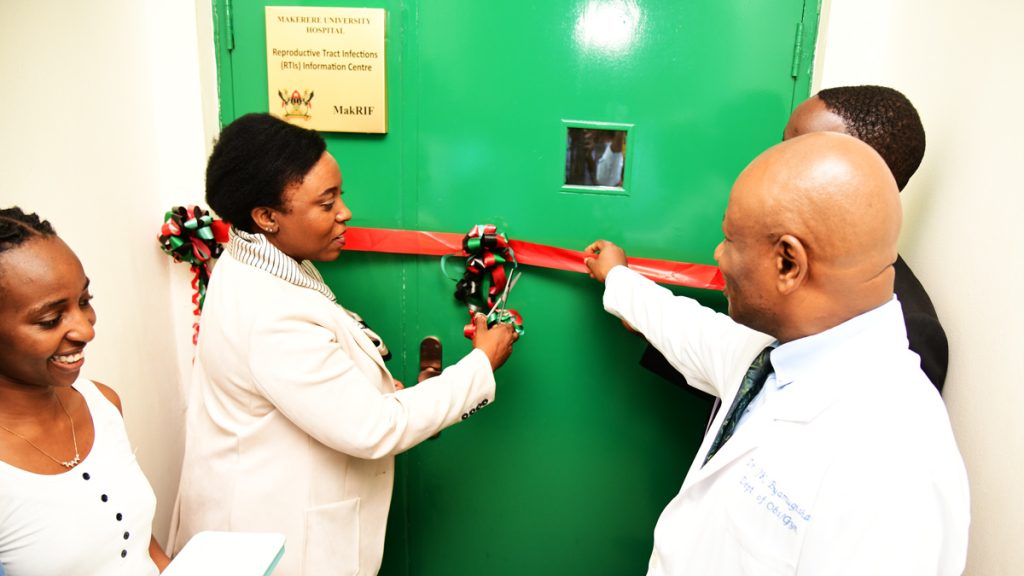
Prof. Byamugisha emphasized the need for individuals to seek medical care and treatment as soon as any symptom related to RTIs is detected. He thanked the Directorate for ICT Support (DICTS) led by Mr. Samuel Paul Mugabi for playing a central role in the development of the Mak RIT App.
The Mak RTI Information Centre and Mobile App were officially launched by the Deputy Vice Chancellor (Academic Affairs)-DVCAA, Prof. Umar Kakumba represented by the Principal of the College of Health Sciences (CHS), Prof. Damalie Nakanjako.
The DVCAA commended the Director, Makerere University Hospital for bringing on board a multi-disciplinary research team to address the information gap on RTIs and health services in general. He also applauded the University Hospital for continuously coming up with health products and innovations in line with the University’s digitalization agenda. He underscored that the Mak RTI App and Mak RTI Information Centre would enable students, staff and the public to access the right information on RTIs and health services in general from any part of the country.
“As I launch the Mak RTI Information Centre and Mak RTI App, I am pleased to note that most disciplines such as health, social sciences, gender, communication and the media have participated in the processes leading to this research output. Matters of health should not be left to the doctors alone. Health should be a matter of concern for all of us. We can never have perfect health if we do not collaborate and bring different teams together,” said the Principal.
Prof. Nakanjako said the College of Health Sciences takes the lead in the utilisation of government funds to support research and innovation at Makerere University. She congratulated the Mak Hospital, which is under the College of Health Sciences, for conducting the research and coming up with the Mak RTI App.
She further highlighted that the College of Health Sciences exists to provide transformative education and research to meet societal needs. “Research is mainly to solve problems in the community, therefore, the Mak RTI App and Information Centre is an example of research that supports the community,” she elaborated. She appreciated the Ministry of Health for continually working with the College of Health Sciences to advance research in Uganda and beyond.
On behalf of the Ministry of Health, Dr. Richard Mugahi, Assistant Commissioner Reproductive and Infant Health, applauded the Makerere University Hospital, the research team and DICTS for developing the Mak RTI App. “In this digital era, this is what is expected. The young people are more digitally oriented. I also commend the shift from the term STI (Sexually Transmitted Infections) to RTI (Reproductive Tract Infections),” he said.
Dr. Mugahi expressed the readiness of the Ministry of Health to integrate the Mak RTI App into its digital products and services. He indicated that the Ministry of Health already has a hotline, and this would be linked with the University Hospital RTI App.
Ms. Ritah Namisango, the Principal Public Relations Officer, and a Member of the Research team re-affirmed that the Mak RTI App presents a convenient and user friendly approach for students, staff and general hospital to access health services at the University Hospital. She urged all attendees to share information about the Mak RTI app widely so that it can reach everyone in need of RTI services.
On behalf of DICTS, Mr. Juma Katongole, the Principal Information Systems Administrator said that the development of the Mak RTI App is anchored in the DICTS mandate of working with the different units at the University to optimize and automate all university business processes/services. Mr. Katongole also assured the student leaders who attended the launch that the information received through the Mak RTI App will be treated with confidentiality and accessed by only the University Medical Team with the mandate to attend to students, staff and the public in general.
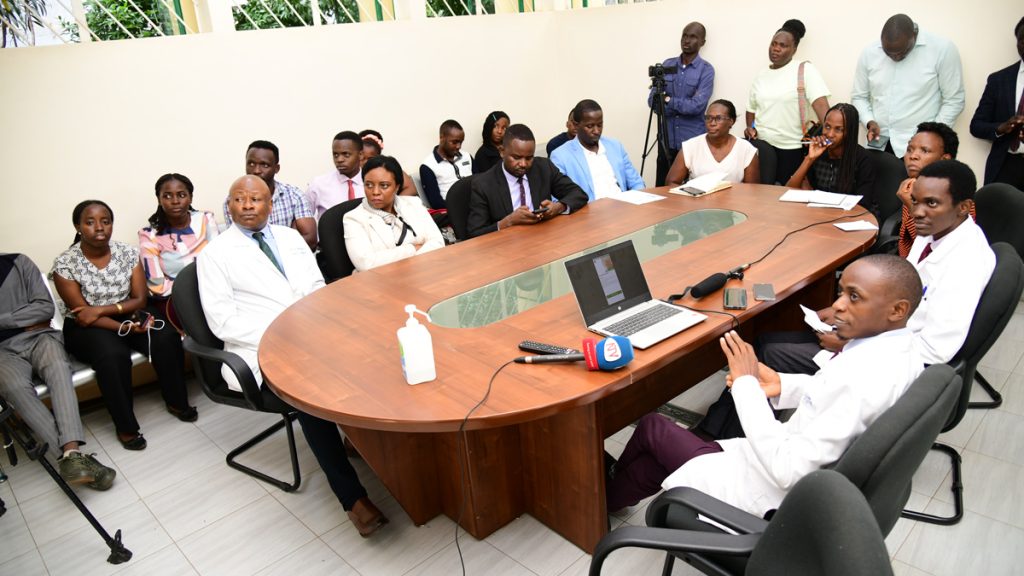
Responding to questions from student leaders from the respective Colleges and Halls of Residence, the Mak RTI Project Coordinator Dr. Hassan Mulema emphasized that the App is very secure and as such, users should not be worried about any information leakages. The medical team at Makerere University Hospital will continue to uphold matters of privacy, confidentiality and the ethical standards that govern the medical profession when using the Mak RTI App to provide services to students, staff and the general public.
The Mak Students’ Guild who attended the launch appreciated the University Hospital for coming up with the Mak RTI App, which is bringing the health services closer to the people. The student leaders pledged to popularize the Mak RTI App to the University community.
The launch of the Mak RTI App that was witnessed by medical practitioners, the Ministry of Health, Mak Student Leaders, Public Relations Office, DICTS, Journalists and staff from Makerere University Hospital was moderated by Ms Ritah Namisango assisted by Dr. David Mukasa.
Important notes: The Mak RTI App is a one-stop center for reproductive tract infection and other health services available at Makerere University hospital. The app enables users easily talk to medical officers for any services they may be in need of. The app is currently available for android users and can be downloaded on the Google Play Store using this link: https://play.google.com/store/apps/details?id=com.makererehospital.rti
General
Launch of Mak Attendance Management System a Moment of Truth
Published
4 days agoon
May 3, 2024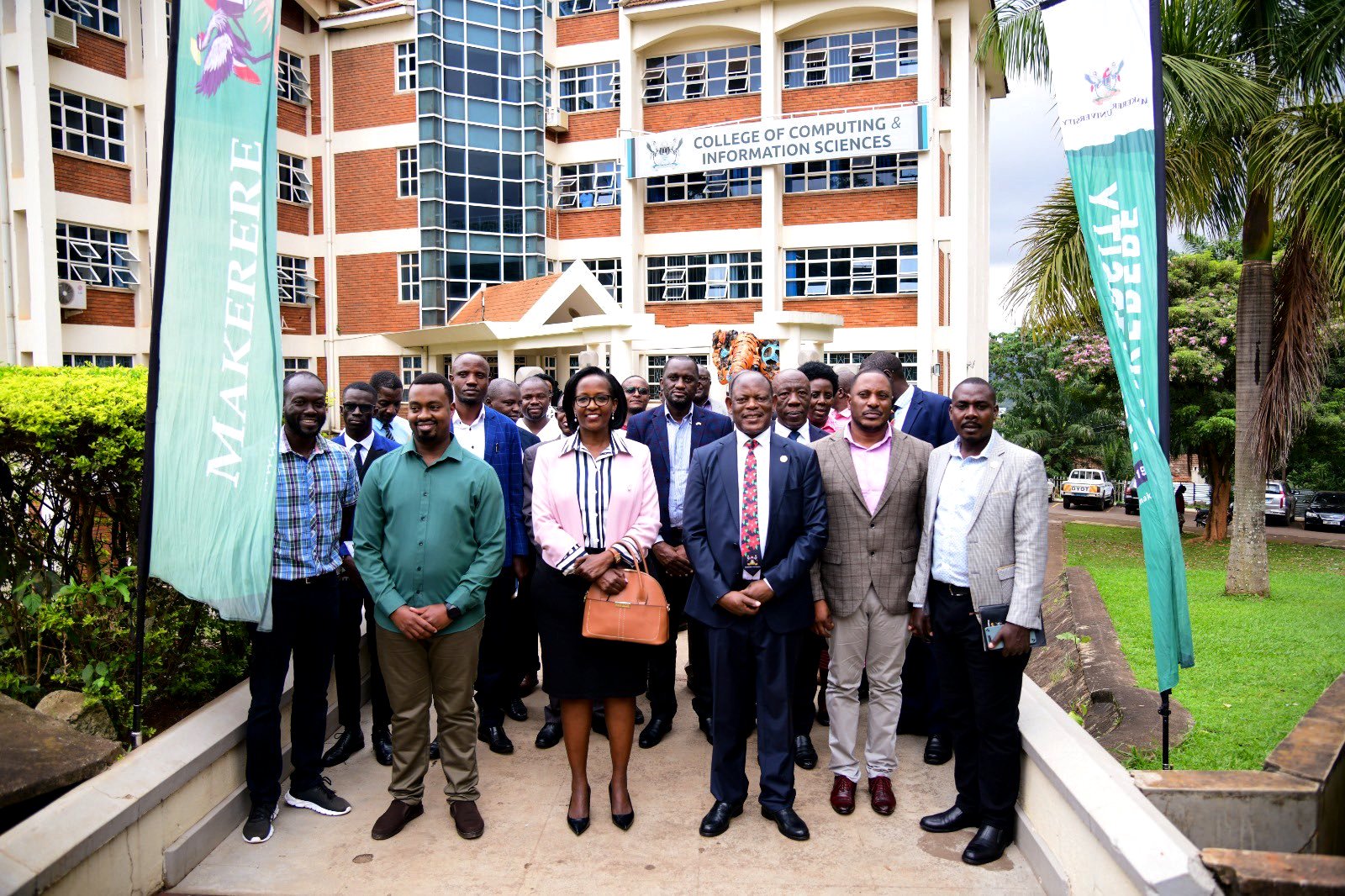
The launch of Staff and Student Attendance Management System presided over by the Chairperson of Council, Mrs. Lorna Magara on Friday 3rd May 2024 has been heralded as a moment of truth for the Council, Management, Staff, Students and Stakeholders of Makerere University. On Council’s part that includes improved performance management, accountability, and a transparent promotion process, while for Management it signifies a milestone in terms of achieving a professionally governed university and guaranteeing academic freedom. For staff and students it means improved monitoring and evaluation of teaching, learning and research activities, and for the Government and people of Uganda, clear accountability for the over UGX 200 billion annual wage bill.
In her remarks, Mrs. Magara took time off to allay fears that the system has been designed as a policing tool, stating that the University Council had carefully considered the multifaceted roles that staff, especially faculty, engage in both on and off-campus. The Council, she said, had therefore provided clear guidance to Management on allowances and authorisations that must be in place to enable faculty fulfil their functions.
She added that the decentralised collegiate system already caters for the direct supervision of faculty, while a similar devolved architecture applies to administrative and support staff. “So as we embrace this biometric system, I invite you to recognize the collective benefit it brings to Makerere University.”
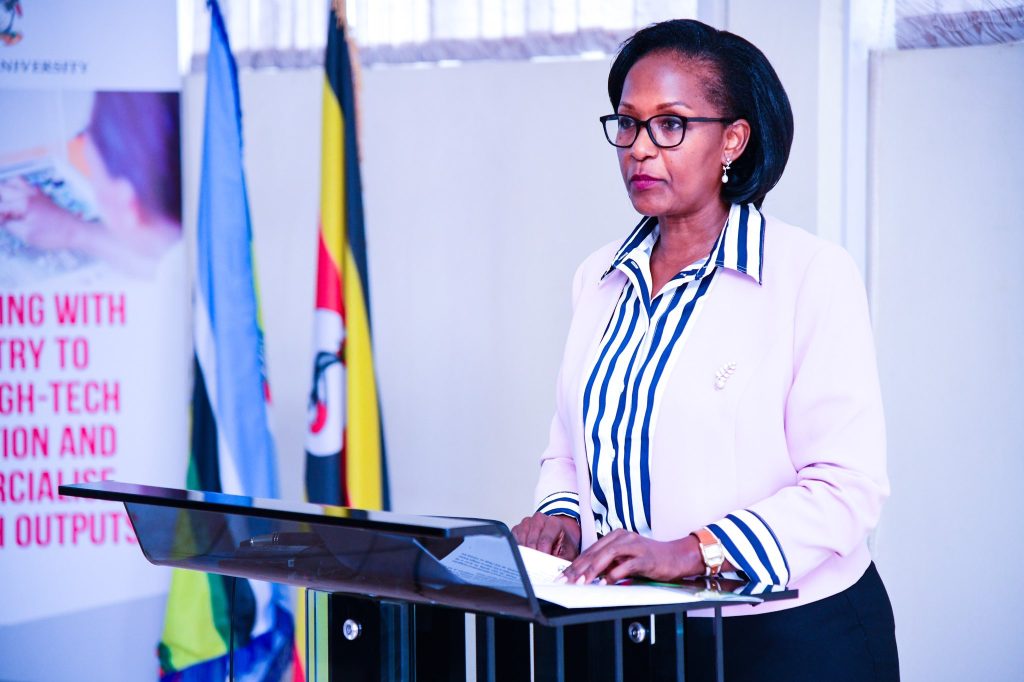
These benefits, noted the Chairperson of Council, include; improved service delivery for faculty, students and the administration, improved institutional ratings, as well as improved visibility and credibility for the system developers. She further noted that the attendance management system is only a fraction of the more comprehensive and holistic approach that the University Council is undertaking to strengthen performance management.
“In the current and future budgeting and other resource allocation processes, the Council prioritizes the acquisition of tools that enable the staff to perform and the students to learn effectively and in a conducive manner. For example, I am aware that the procurement processes for three buses for transporting students for field practicals has already been completed.
“The renovation of Lumumba Hall is nearing completion and Mary Stuart Hall will follow in line. There is increasing emphasis on research labs, teaching materials and related equipment. As part of our infrastructure development focus, the Council also addresses the need for faculty offices, graduate student centres, IT hardware and software for teaching and research” Mrs. Magara explained, concluding by requesting all staff and students to embrace the system.
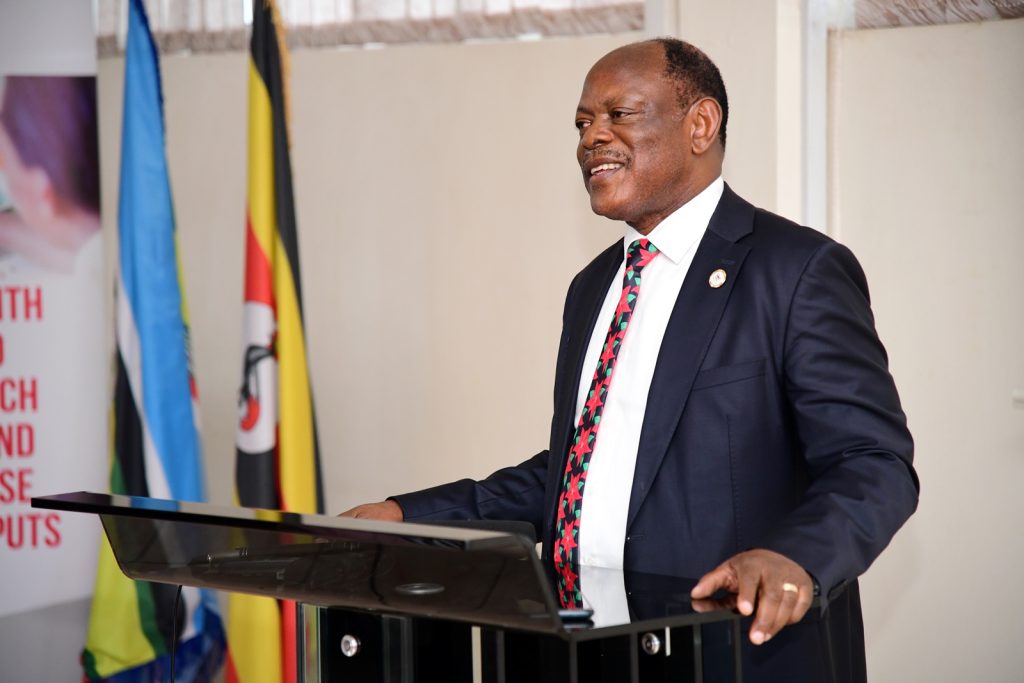
In line with embracing the system, the Vice Chancellor, Prof. Barnabas Nawangwe noted that the advent of the system should be received with happiness by all staff and students. “We must run our university professionally and the best way to do it is by going digital in every way possible.”
He added that Makerere has in addition to attendance management digitalised other activities such as human resources management, data repository, academic records and processes, research management, and prayed all business processes would have been completed by the end of 2024. The Vice Chancellor reiterated that the attendance management system’s implementation framework had been enriched by the input from staff representatives to cater for all teaching modes, including eLearning.
Prof. Nawangwe further emphasised that the system is in no way designed to curtail academic freedom, but rather promote it through proper accountability for time spent at the workplace. “The Council as our employer ought to know whether the person that is employed is doing their job.”
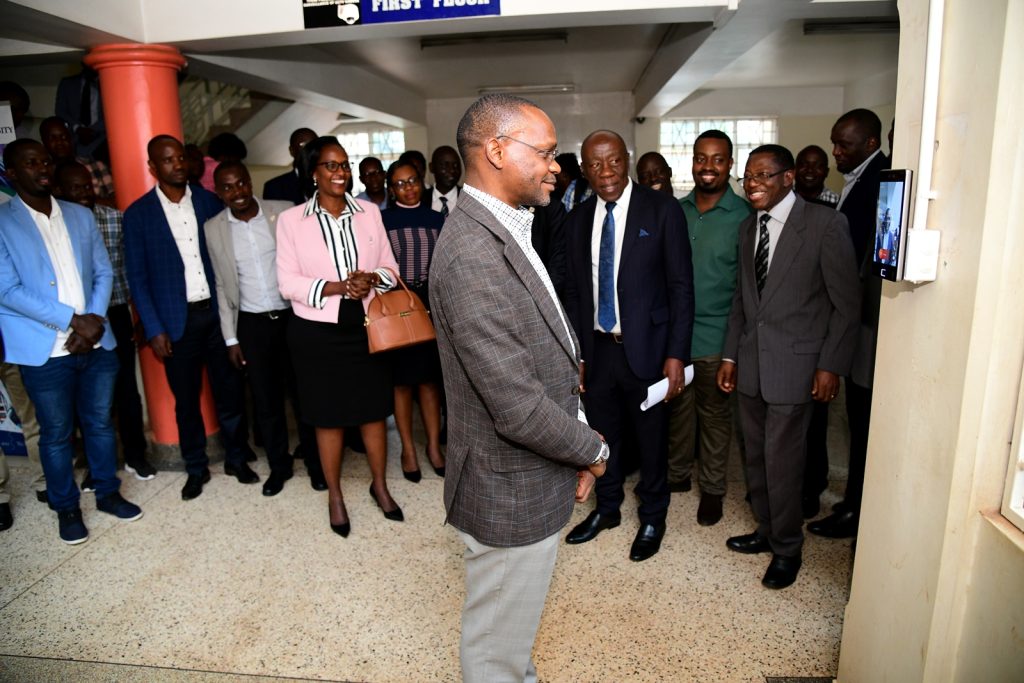
He therefore thanked the Director, Directorate for ICT Support (DICTS), Mr. Samuel Mugabi and his staff for alleviating the need for Makerere to rely on expensive, externally-sourced systems. “Since we realized the resources that we have in-house, the digitalisation of the university has just gone up.”
The Director Human Resources (HR), Mr. Tayari Deus Mujuni on his part thanked the University Council for ensuring that development of the system was funded, Management for ensuring that the system is implemented, and the Director DICTS for ensuring that the system is developed and delivered on time.
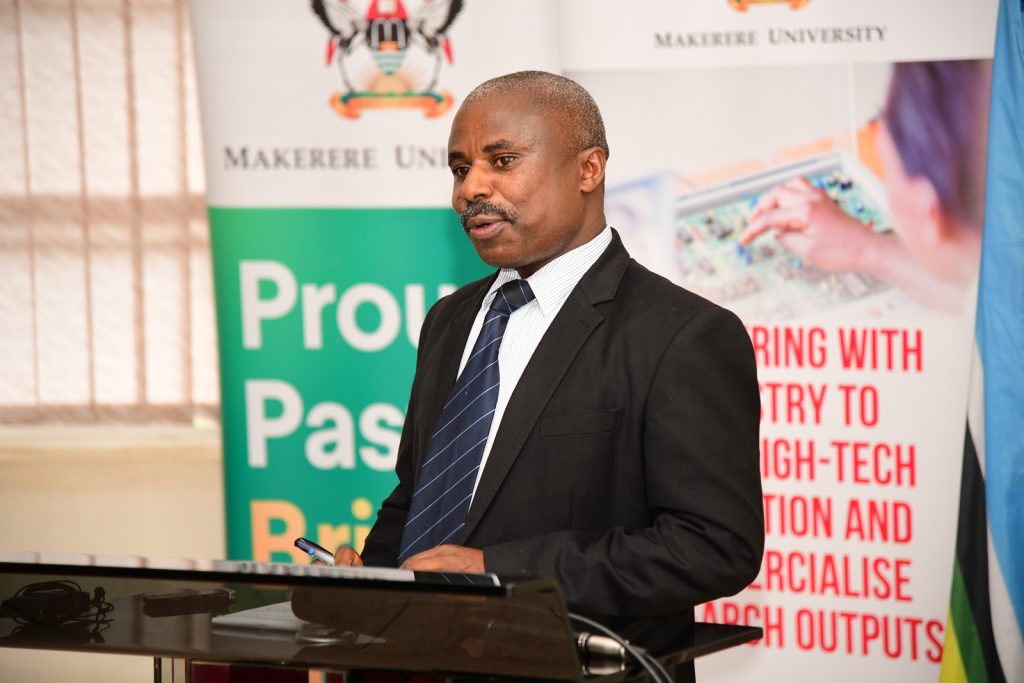
One of the deliverables of the system will be human resource analytics. Mr. Mujuni commended this output as a quick way to measure whether staff are delivering according to their mandate. “If we continually generate these analytics, it becomes easy for us to know the teaching load, to follow up on requests for staff appointments in terms of how many staff you have and how many staff you need.”
The Director HR further noted that the system will come in handy in providing accountability to Government in terms of staff and students being taught. “The audit query will not arise again because we will have the evidence of all staff in attendance and account the funds that Government has contributed in terms of wage.”
Presenting the system’s architecture, Mr. Samuel Mugabi said it consists of biometric devices to enable staff clock in/out using their thumb-print or facial-image. For those who may for any reason or impairment not be able to reach the height of the biometric devices, an AI-enabled voice-recognition capability is being explored for future deployment.
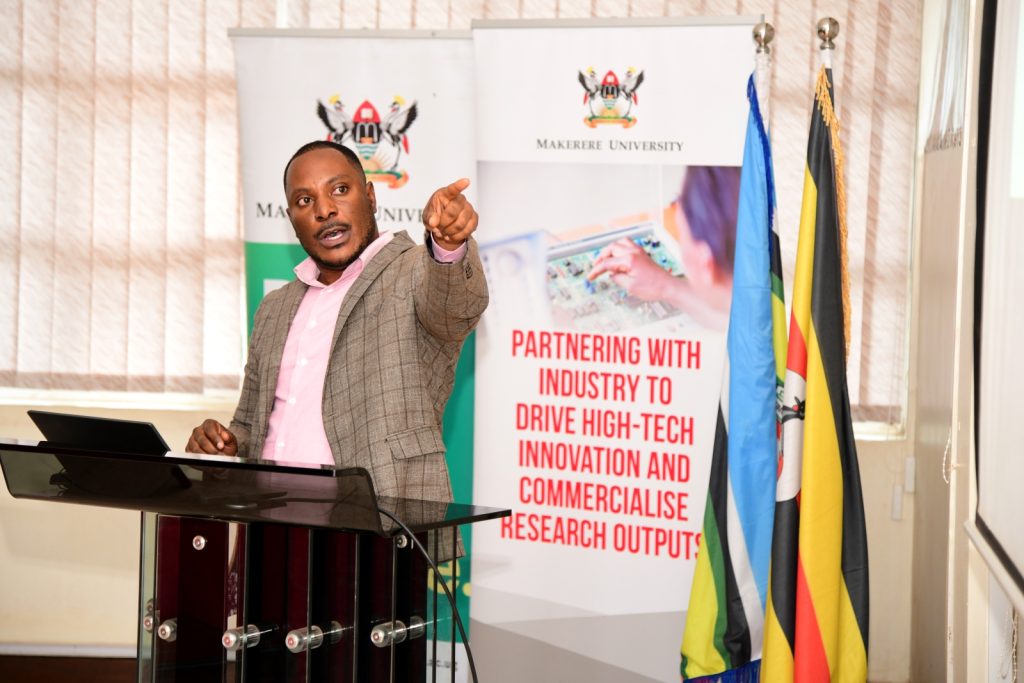
He added that for teaching staff, a student attendance management system has been developed and integrated with both Academic Management Information System (ACMIS) and the electronic-Human Resource Management System (e-HRMS). This will enable students to register class attendance by selecting their time-tabled course, lecturer’s name, and submit their attendance register. The system will register GPS coordinates of teaching venues and any registration done using a mobile-based app on a device that is not within range will not be recorded.
Mr. Mugabi nevertheless appreciated that cultural transformation is very important for the system to succeed. “We cannot transform or automate a process until we appreciate why it is important,” adding that the way system users are brought on board is very important for their adoption and use.
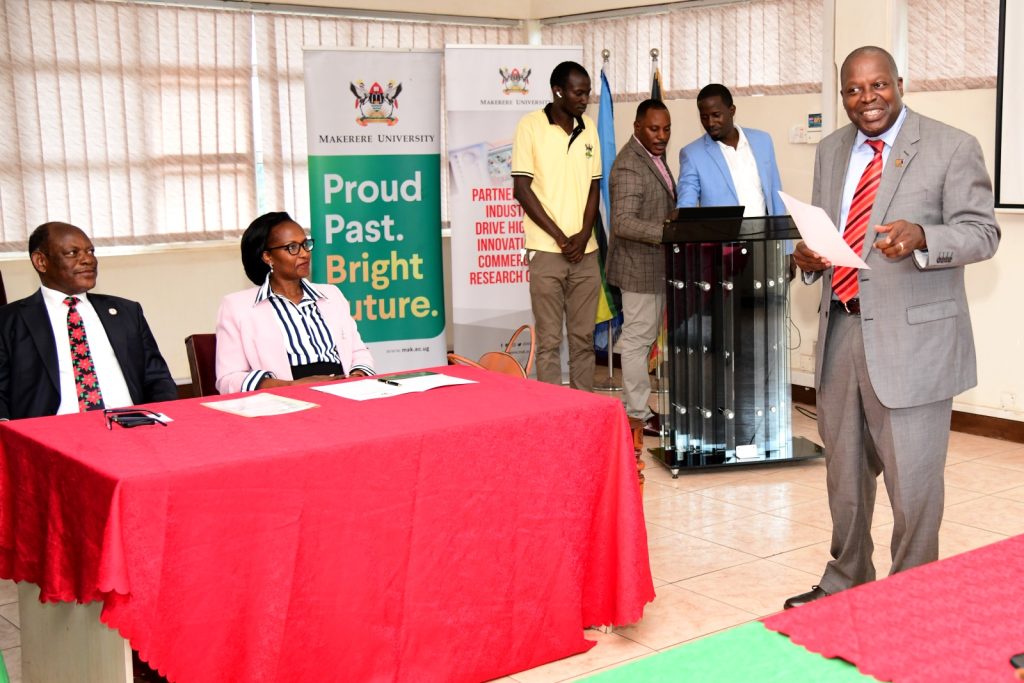
The launch event was proudly by the College of Computing and Information Sciences (CoCIS), which prides itself in conducting high-quality research and educating the next cadre of leaders, entrepreneurs, teachers, skilled labor force, digital innovators, wealth creators, and young scientists. Addressing his audience the Principal Prof. Tonny Oyana noted that CoCIS, by virtue of its mandate, will remain a very important college, especially in the next 20 – 30 years as the digital revolution unfolds. “We are at the forefront of deliberations anywhere in this university.”
He recognised the presence of the Chairperson of Council, Members of Council, Vice Chancellor, Deputy Vice Chancellors, Members of Management, College Principals, Staff and Students who graced the event.
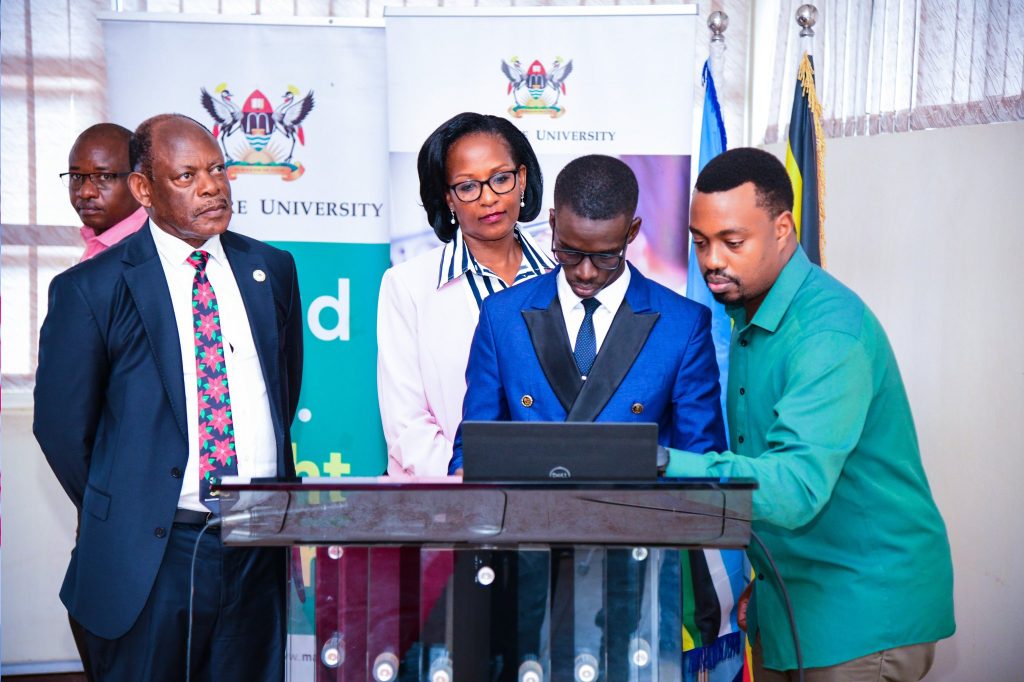
H.E. Vincent Lubega Nsamba was on 18th March 2024 sworn in as the 90th Guild President of Makerere University and effectively, leader of the Guild Cabinet and student body. Represented by his Minister for Information, Research and Computer Technology, Hon. Emojong Kisaija Harman at the launch, the Guild President welcomed the system, given the necessity of adopting of ICT in the digital era.
“We as the Students Guild are optimistic that this initiative and the system being launched today will improve service delivery to students with regard to teaching” appreciated Hon. Emojong. He reassured the University Leadership of the Students Guild’s readiness to participate in the system rollout and willingness to raise awareness among the student body of its benefits.
General
Mak Counselling & Guidance Centre, UVA Launch Book on Alcohol Addiction Treatment in Uganda
Published
5 days agoon
May 2, 2024By
Mak Editor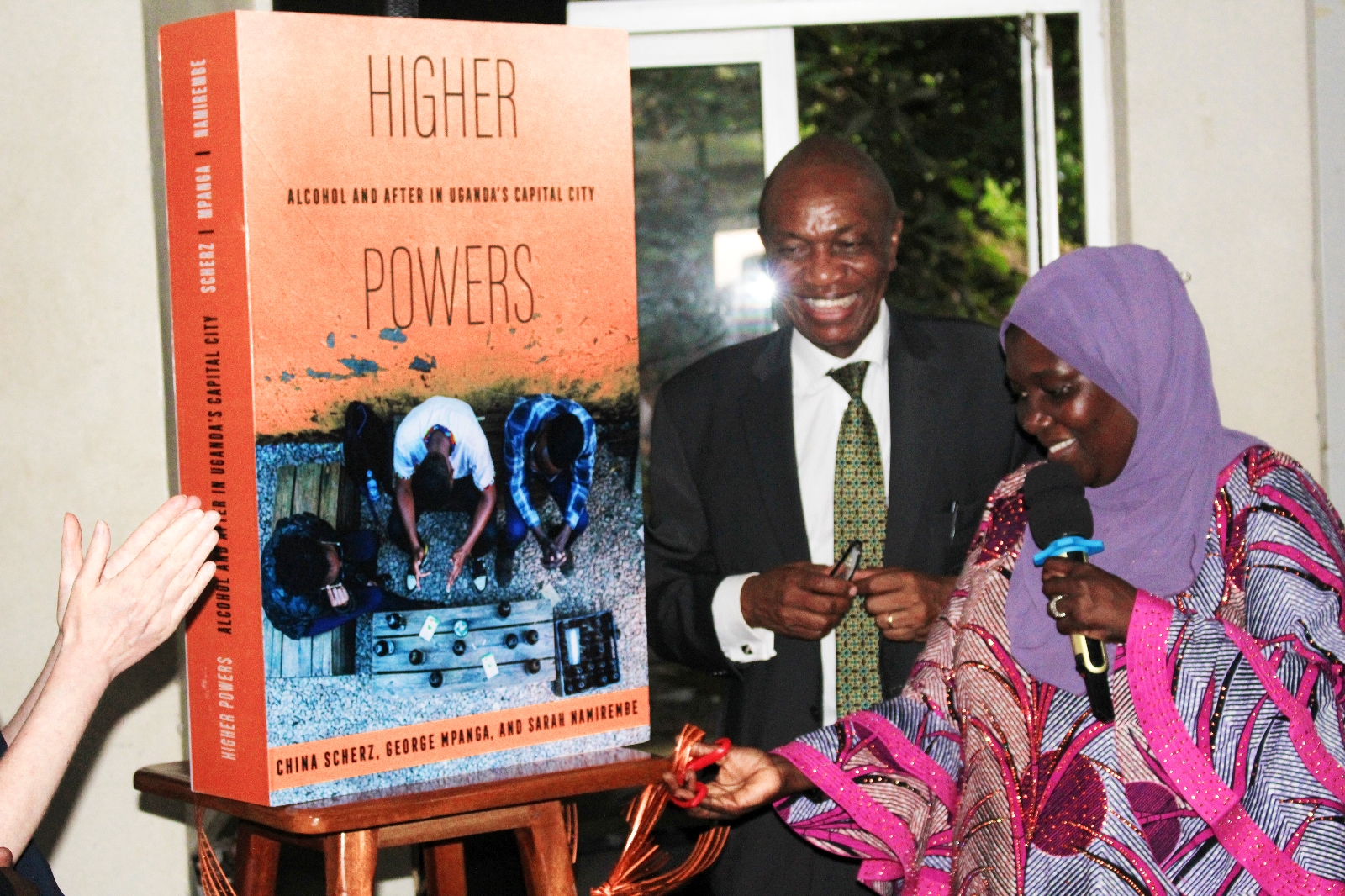
Higher Powers: Alcohol and After in Uganda’s capital city, a collaborative literary work on alcohol addiction and treatment giving the Ugandan context authored by Ugandan researchers Sarah Namirembe and George Mpanga, together with University of Virginia (UVA)’s Associate Professor China Scherz was officially launched on Friday 26th April 2024. The event was held in the Conference Hall of the School of Food Technology, Nutrition and Bioengineering at Makerere University.
The convener, Henry Nsubuga, the Manager of the Counselling and Guidance Centre at Makerere University thanked the authors of the book for conducting research and bringing to the scholarly and practice world another perspective to treating those with alcohol use disorder (AUD).
The book, a result of over four years of dedicated research, discusses therapeutic pathways to alcohol addiction recovery in Uganda, detailing how some victims mainly in Kampala have used these methods to completely recover from the vice.
According to George Mpanga one of the authors, “most of the work took place in Uganda’s capital city Kampala; given the number and variety of options, including the country’s two major rehabilitation programmes. Kampala provided us with an excellent location for exploring a range of treatment modalities available in Uganda.”
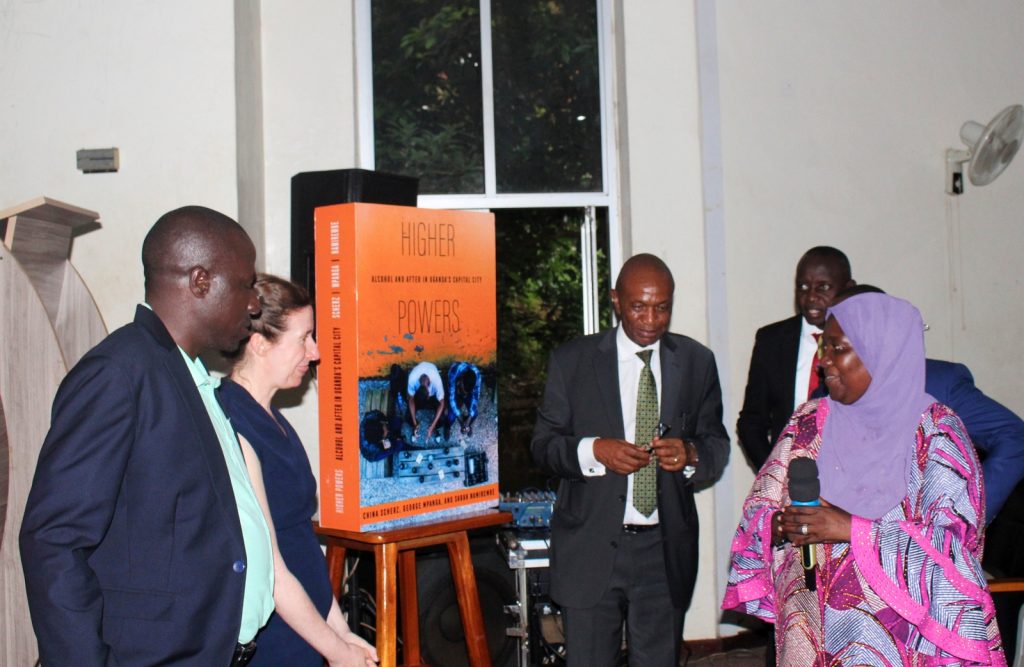
Higher Powers mainly focuses on four recovery approaches: Biological, Social, Clinical, and religious approaches. Under the religious approach, the authors write that some addicts find healing in church while others in the traditional shrines or through herbal medicines.
Assoc. Prof. China Scherz says through collaboration, they are bringing insights from Uganda and other parts of Africa about the ethics of interdependence into a rapidly expanding conversation about the need for more collaborative forms and logical practice. She says collaborative writing has helped them come up with a book none would solely produce.
“We are bringing insights from Uganda and elsewhere in Africa, about the ethics of interdependence into a rapidly expanding conversation about the need for more collaborative forms and logical practice. And in the process, hoping to transform a long history of important but often invisible contributions made by assistants and translators, Pan Africanist anthropology, this process of writing together across a wide range of sites has ultimately transformed the project into something that none of us could have created independently of one another,” she said.
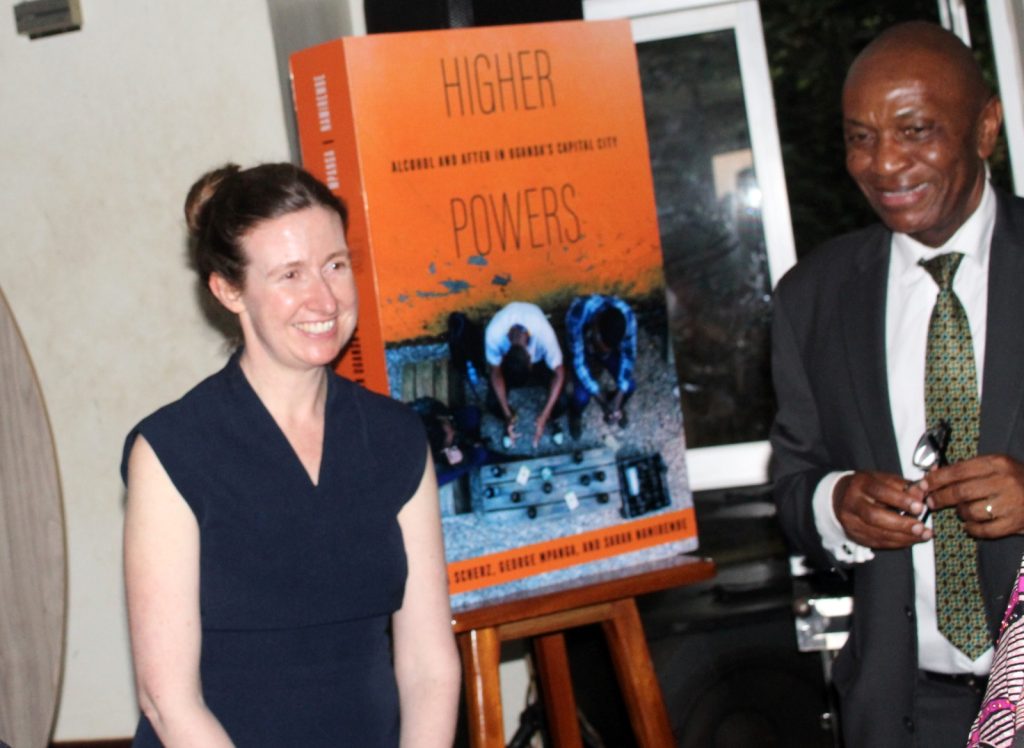
The book was launched by Dr. Hafsa Lukwata, the Assistant Commissioner for Health Mental Health and Center of Substance Abuse at the Ministry of Health, who the Permanent Secretary, Dr. Diana Atwine.
Dr. Lukwata thanked the authors of the book and all participants who accepted to be respondents during the research. She said the government of Uganda is tirelessly pushing for the alcohol control bill to mitigate alcohol misuse, and urged everyone to be part of the cause so that the bill is passed.
Prof. Nazarius Mbona Tumwesigye, from the School of Public Health, said the book is rich with many educating stories and urged everyone to grab a copy and make good use of it.
“This work is very good and it has so many enriching stories. There are many things you can learn from this book and I wish everyone reads it,” he said.
Dr. David Basangwa, former head at Butabika Hospital Alcohol and Drug Unit said the title of the book was well selected and it contains a lot of meaning, especially in dealing with various challenges in life.
“The title given to this book: Higher Powers, I find it very interesting and well selected with a lot of meaning, especially when it comes to dealing with various challenges in life,” he said.
Basangwa noted that there is a need to deal with stigmatisation among alcohol addicts, pointing out language euphemisms as one of the best approaches. He said alcohol addicts feel more comfortable being called patients with alcoholic use disorders, but not alcohol or drug addicts.
The book launch was attended by policy makers, treatment specialists, people who have recovered from alcohol use disorder, members of Makerere University academic staff, and students.
Through an access contract with the University of California, a PDF version of the book has been availed at no cost.
To obtain a complimentary PDF copy, please click on the link provided below.
Trending
-
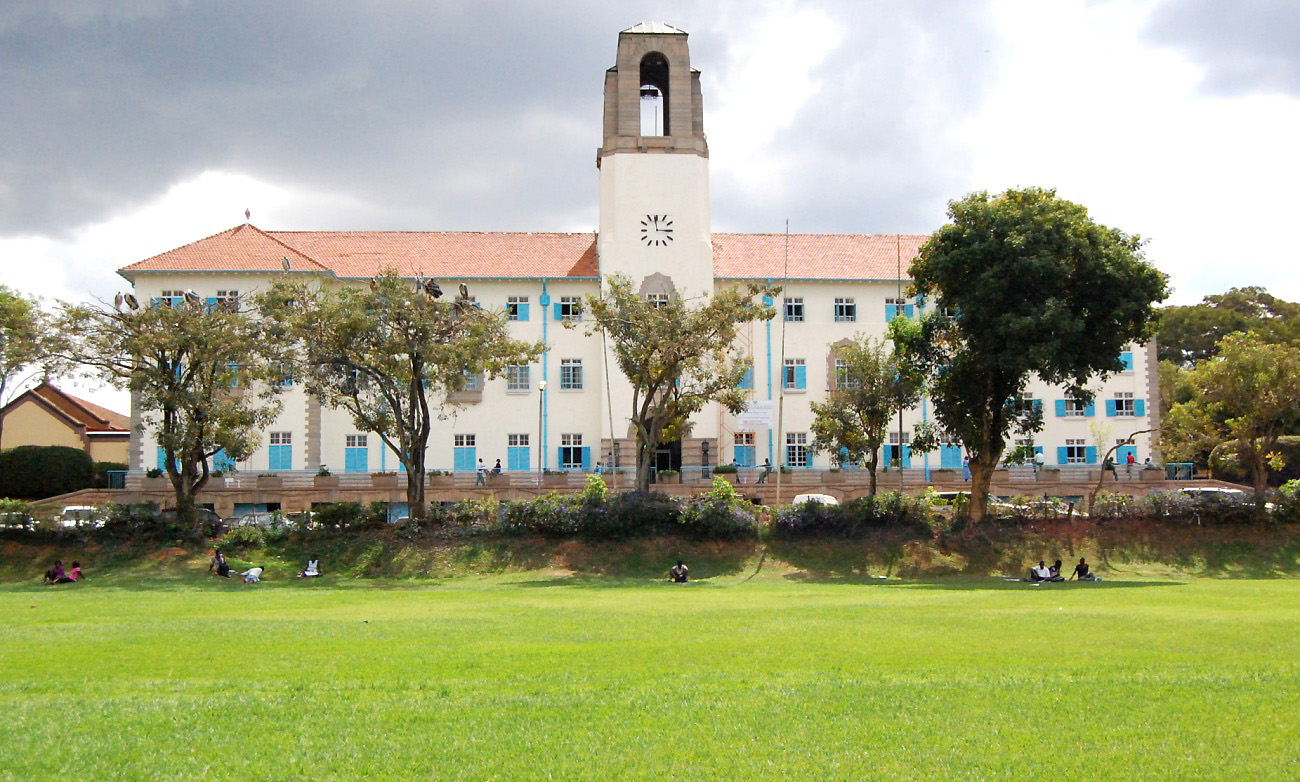
 General1 week ago
General1 week agoAdvert: Admissions to Undergraduate Programmes 2024/25 AY
-
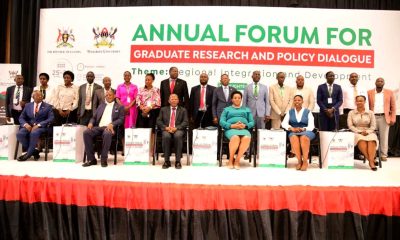
 Research2 weeks ago
Research2 weeks agoHon. Dr. Muyingo Officially Launches Graduate Forum, Research Management System
-
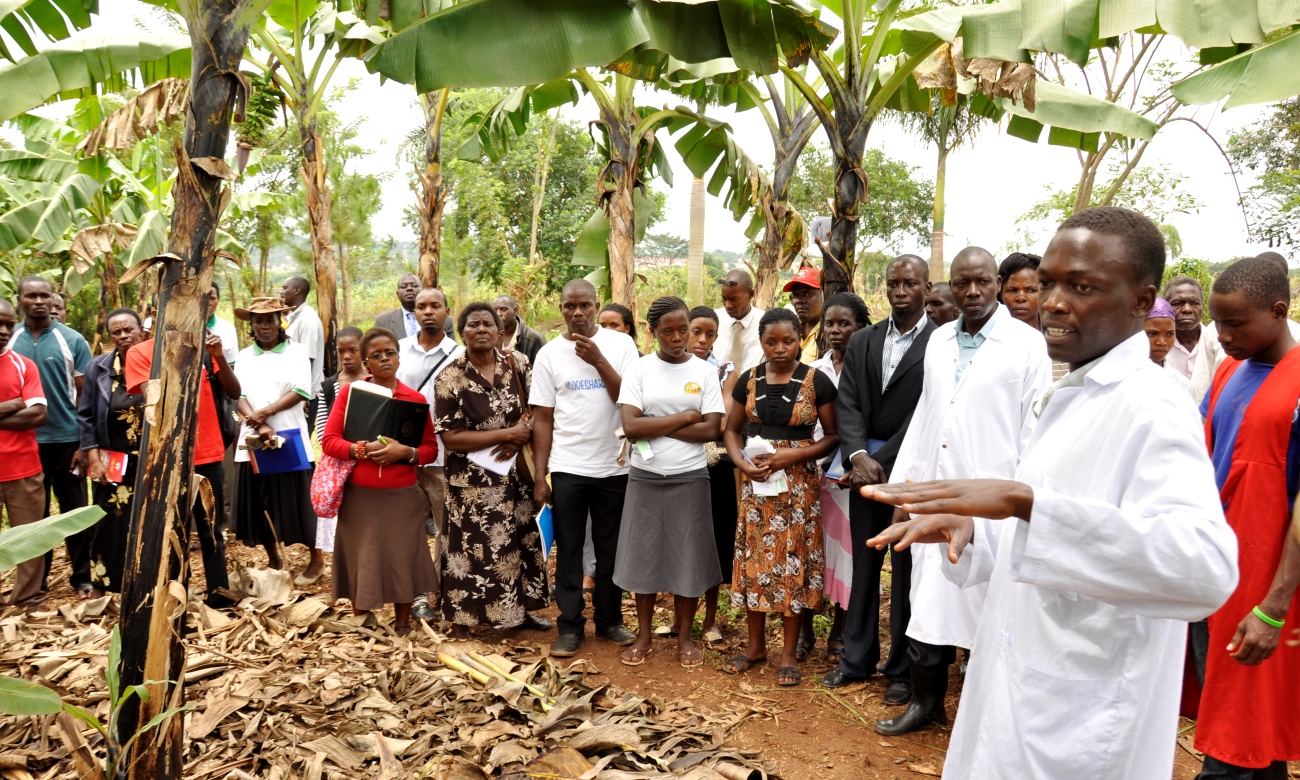
 Agriculture & Environment5 days ago
Agriculture & Environment5 days agoCall For Scholarship Applications: Masters and PhDs in Climate Smart Agrifood Systems
-
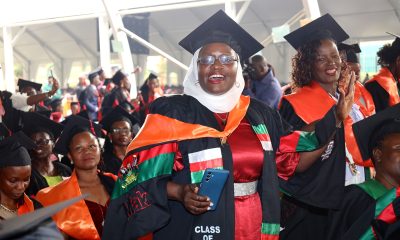
 Education1 week ago
Education1 week agoCall for Applications: Full-Time Scholarship for Master Programme in Global Development, Crisis and Change at UiA
-
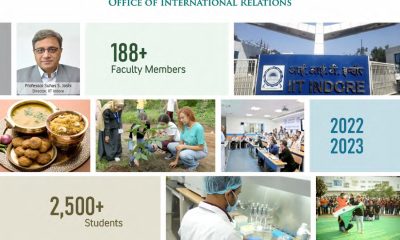
 General2 weeks ago
General2 weeks agoAdmissions opportunity for International students at Indian Institute of Technology (IIT)
